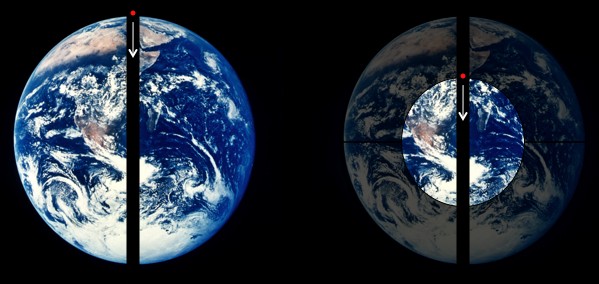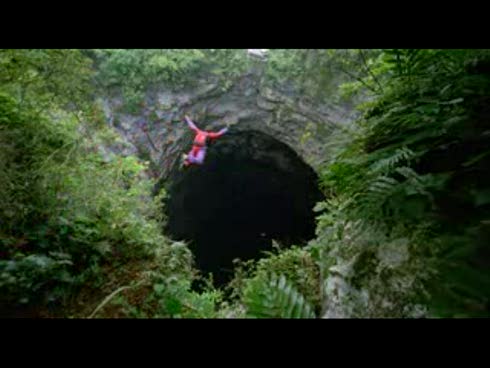Physicist: This is a beautiful question, in a small part because it’s an interesting thought experiment with some clever math, but mostly because of all the reasons it couldn’t be done and wouldn’t work. Right off the bat; clearly a hole can’t be drilled through the Earth. By the time you’ve gotten no more than 30 miles down (less than 0.4% of the way through) you’ll find your tunnel filling will magma, which tends to gunk up drill bits (also melt everything).
But! Assuming that wasn’t an issue, and you’ve got a tube through the Earth (made of unobtainium or something), you still have to contend with the air in the tube. In addition to air-resistance, which on its own would drag you to a stop near the core, just having air in the tube would be really really fatal. The lower you are, the more air is above you, and the higher the pressure. The highest air pressure we see on the surface of the Earth is a little under 16 psi. But keep in mind that we only have about 100 km of real atmosphere above us, and most of that is pretty thin. If the air in the tube were to increase in pressure and temperature the way the atmosphere does, then you’d only have to drop around 50 km before the pressure in the tube was as high as the bottom of the ocean.
Even worse, a big pile of air (like the atmosphere) is hotter at the bottom than at the top (hence all the snow on top of mountains). Temperature varies by about 10°C per km or 30 °F per mile. So, by the time you’ve fallen about 20 miles you’re really on fire a lot. After a few hundred miles (still a long way from the core) you can expect the air to be a ludicrously hot sorta-gas-sorta-fluid, eventually becoming a solid plug.
But! Assuming that there’s no air in the tube, you’re still in trouble. If the Earth is rotating, then in short order you’d be ground against the walls of the tunnel, and would either be pulverized or would slow down and slide to rest near the center of the Earth. This is an effect of “coriolis forces” which show up whenever you try to describe things moving around on spinning things (like planets). To describe it accurately requires the use of angular momentum, but you can picture it pretty well in terms of “higher things move faster”. Because the Earth is turning, how fast you’re moving is proportional to your altitude. Normally this isn’t noticeable. For example, the top of a ten story building is moving about 0.001 mph faster than the ground (ever notice that?), so an object nudged off of the roof can expect to land about 1 millimeter off-target. But over large changes in altitude (and falling through the Earth counts) the effect is very noticeable: about halfway to the center of the Earth you’ll find that you’re moving sideways about 1,500 mph faster than the walls of your tube, which is unhealthy.
But! Assuming that you’ve got some kind of a super-tube, that the inside of that tube is a vacuum, and that the Earth isn’t turning (and that there’s nothing else to worry about, like building up static electricity or some other unforeseen problem), then you would be free to fall all the way to the far side of the Earth. Once you got there, you would fall right through the Earth again, oscillating back and forth sinusoidally exactly like a bouncing spring or a clock pendulum. It would take you about 42 minutes to make the trip from one side of the Earth to the other.

The clever math behind calculating how an object would fall through the Earth: As you fall all of the layers farther from the center than you cancel out, so you always seem to be falling as though you were on the the surface of a shrinking planet.
What follows is interesting mostly to physics/engineering majors and to almost no one else.
It turns out that spherically symmetric things, which includes things like the Earth, have a cute property: the gravity at any point only depends on the amount of matter below you, and not at all on the amount of matter above you. There are a couple of ways to show this, but since it was done before (with pictures!), take it as read. So, as you fall in all of the layers above you can be ignored (as far as gravity is concerned), and it “feels” as though you’re always falling right next to the surface of a progressively smaller and smaller planet. This, by the way, is just another reason why the exact center of the Earth is in free-fall.
The force of gravity is , where M is the big mass, and m is the smaller, falling mass. But, since you only have to consider the mass below you, then if the Earth has a fixed density (it doesn’t, but if it did) then you could say
, where ρ is the density. So, as you’re falling
.
Holy crap! This is the (in)famous spring equation, F = – kx! Physicists get very excited when they see this because it’s one of, like, 3 questions that can be exactly answered (seriously). In this case that answer is , where R is the radius of the Earth, and t is how long you’ve been falling. Cosine, it’s worth pointing out, is sinusoidal.
Interesting fun-fact: the time it takes to oscillate back-and-forth through a planet is dependent only on the density of that planet and not on the size!









Gravity! shavity! Forget the “falling” for a minute. What if I placed the galaxy’s longest ladder (made out of unobtainium) down through this hole, and then tried climbing down it. On the other side, what would arrive first? My feet or my head?
If anything, your ashes 🤓